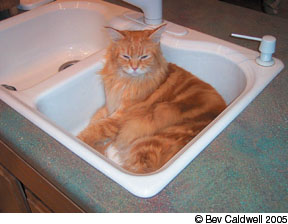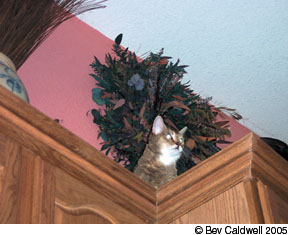Pariah: a social outcast, an untouchable, a person who is rejected from society or home. Although the term pariah has traditionally been applied to humans, animal behaviorists have also come to use it in certain cases to describe members of other species. While these definitions are meant for people, says Terry Curtis, DVM, a board-certified clinical behaviorist at the University of Florida College of Veterinary Medicine, the definition also applies to cats.

288
Relationship Issues
Cats at large congregate around food sources and form social groups. Within the group, cats form relationships based on factors such as temperament and personality, exposure to other cats over time and the existence of familial ties. As cats come and go, the social structure changes. These relationships are fluid, just like in people, says Dr. Curtis.
Cats in multi-cat households form social relationships similarly to cats that interact outdoors. When one cat in the group is constantly picked on or ostracized by the other group members, the ostracized cat is called a pariah. Exactly why a cat becomes a pariah in the group is unclear, but it may have something to do with low self-esteem or anti-social behavior. I dont think anyone knows which comes first: a bully cat that causes the pariah cat to act the way it does or the cat with the low self-esteem that causes another cat or cats to act like a bully, says Dr. Curtis.
A cat with low self-esteem may seem fearful or overtly hostile, and exhibit defensively aggressive behavior such as growling or hissing when approached. Cats are more likely to treat a fearful, hostile cat as a pariah, says Katherine A. Houpt, VMD, PhD, director of Cornell Universitys Animal Behavior Clinic.
A pariah cat may run or hide from the others or keep to itself. Pariah cats assume hunched posture, wrap the tail around the body and slink when they move, says Dr. Houpt, who is board-certified by the American College of Veterinary Behaviorists. Other members of the group may stare at the pariah or stalk, chase or even corner the cat. The aggressive cat will stand tall and have the tail down, and stare with the ears turned so the openings face back, says Dr. Houpt.
How often the aggression occurs varies and may depend on how scarce the pariah makes itself. A pariah that stays safely out of the way can maintain a semblance of normalcy – assuming the cat can get to the litter box, receive human attention and eat. But at times when interaction is unavoidable, such as mealtimes, problems can occur. A pariah may cease to come out into the core area to receive attention or food, says Dr. Curtis, and may cease to use the litter box because it involves crossing the paths of the other cats. The avoidance by the pariah cat may cause the other cats to act more like bullies. It becomes a cycle that needs to be interrupted, says Dr. Curtis.

288
Solutions
Outdoors, a pariah cat has the option to leave and find food sources or even companionship elsewhere. In an indoor multi-cat environment, cats dont necessarily have the ability to pick and choose their feline companions or leave when the going gets tough. Interestingly, not all group members will automatically react to the pariah in a negative way. I have seen instances where a coalition will form between the pariah and another cat of better social standing, says Dr. Curtis. If another cat becomes overly aggressive, however, the problem needs to be addressed.
If you have a pariah cat in your household, the best approach is to modify the environment to accommodate the cat being picked on. Give the pariah cat a separate living area as long as it has a litter box, food, a soft place to sleep and a window, advises Dr. Houpt. A natural barrier such as a door is even better.
If separation is impractical, provide high places for the pariah cat to get out of the way of the other cats. Another option is to bell the other cats so the pariah can hear them coming, says Dr. Houpt.
Behavioral modification can sometimes be achieved by following a program of desensitization and counter-conditioning. Reintroduce the pariah cat into the household as if it were the very first time by taking all of the precautions to make the introduction a slow and positive experience, says Dr. Curtis.
Feliway, which makes cats feel more comfortable in their surroundings, may help. Spray it wherever the scared cat spends most of its time, or better yet, use the plug-in diffuser, says Dr. Houpt. Pharmacological intervention may be necessary. One medication that will decrease anxiety and increase confidence in the pariah, says Dr. Curtis, and another that will decrease the reactivity of the bully. Discuss the options with your veterinarian or a veterinary behaviorist.



